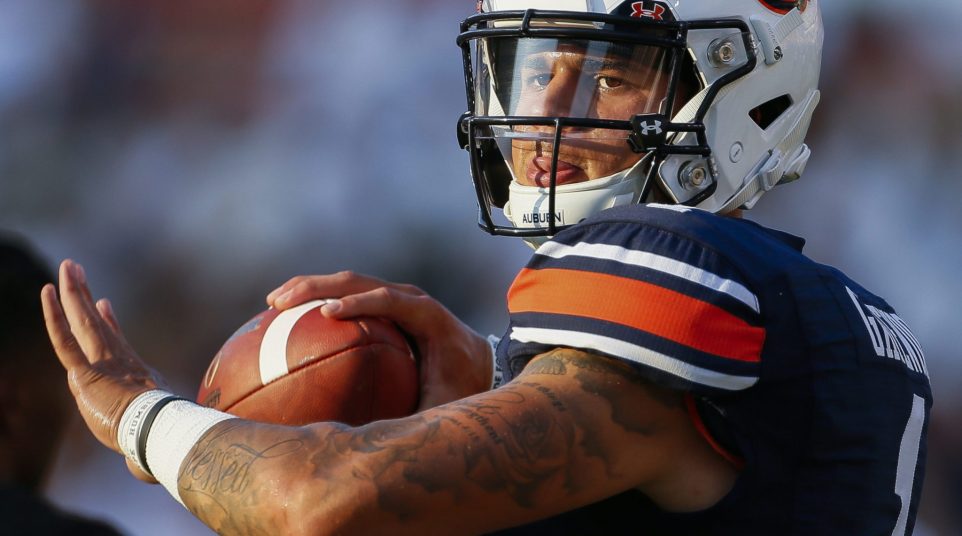
I hope that Joey Gatewood isn't a victim of a transfer system that's (possibly) in transition
Joey Gatewood doesn’t want to sit out a year, and frankly, I don’t blame him.
The idea of being relegated to the sidelines for a 3rd consecutive year is daunting for anyone, much less for a former 4-star recruit who came into college with Cam Newton comparisons. Gatewood is not Newton, at least not yet. The fact that he transferred from Auburn to Kentucky in December probably halted those lofty comparisons.
Due to current NCAA transfer rules, there’s a chance that Gatewood might be relegated to the bench in 2020, as well. Sure, he announced 2 weeks ago that he applied for a waiver for immediate eligibility. It remains to be seen whether Auburn, which is on Kentucky’s 2020 schedule, will try to plead its case to the NCAA that Gatewood shouldn’t be allowed immediate eligibility.
What also remains to be seen is whether the Big Ten’s proposal to allow a 1-time transfer rule without forcing players to sit a year is passed by the NCAA. The organization announced last week that the proposal, which got public support from the ACC, will be voted on this spring.
Here was the last paragraph of the NCAA’s release:
The working group will seek feedback from Division I members through student-athlete representatives, conference offices, impacted coaches associations and other collegiate athletic professional organizations prior to the Council’s April meeting. The group’s goal is to have the new criteria approved for transfers in the 2020-21 academic year.
Add this all up and I fear that Gatewood is going to be left in limbo.
The NCAA said that the group’s goal is to have the new criteria approved for transfers in the 2020-21 academic year. Gatewood, as you recall, transferred during the 2019-20 academic year.
What I can see happening is that pending cases like Gatewood’s will be subject to the NCAA’s current waiver approval process. Go back to the second-to-last paragraph in the release:
The group agrees that a waiver process will remain in place for student-athletes who have transferred previously or otherwise do not qualify for the one-time waiver guidelines. Group members think this waiver process should be limited to truly extenuating and unique circumstances that threaten a student-athlete’s health and safety (for example, if the student-athlete is a victim of physical/sexual assault) while recognizing the impact multiple transfers have on the likelihood that a student-athlete graduates.
Gatewood’s situation is pretty simple. He battled for a starting quarterback job as a redshirt freshman and lost to a true freshman. The true freshman stayed healthy and Gatewood realized he’d run out of eligibility if he didn’t find another place to play.
Are those “truly extenuating and unique circumstances that threaten his health and safety?” No. The kid wants to play, and he’d prefer not to waste a year of his athletic prime because the NCAA says he should.
That’s the issue. Gatewood, had he gone through this exact situation last year, might have actually been more likely to play. After all, Tate Martell got immediate eligibility after realizing he wasn’t going to start over Justin Fields. So did Indiana’s Jack Tuttle, who didn’t have a coaching change when he left Utah as a former 4-star recruit. It’s no secret that blue-chip quarterback recruits tend to get the benefit of the doubt when it comes to waivers for immediate eligibility. Why wouldn’t Gatewood get that treatment this year?
Well, if the NCAA approves this new policy in April, my guess is that it’ll be put in place so that it only impacts transfers who leave in the upcoming school year because the resistance from coaches will be “we don’t want half our roster leaving the second this is announced.” I get that.
What I also get is that the NCAA, if it votes to approve this, will get a major public relations victory (for once). The organization could theoretically deny waivers for cases like Gatewood and still portray the image of “empowering the student-athlete.” Few people are going to bash the NCAA for denying waivers when in short time, the process will be changed.
And of course, there’s always the chance that nothing changes. For all we know, the NCAA will vote against a 1-time transfer exemption and Gatewood will have to wait like others do. Ask Aubrey Solomon about how brutal that can be. That’s frustrating in itself considering the NCAA, in its own release, admitted that their waiver process was “strained.”
Color me surprised that the NCAA didn’t anticipate college athletes in big-revenue sports looking for any way possible to not sit out a year.
Now, it’s worth mentioning that for all I know, the NCAA will rule Gatewood immediately eligible by the time I’m done writing this sentence, and this will look like I was prematurely frustrated (you better believe I searched “Joey Gatewood” on Twitter just now). On Wednesday, we saw former Alabama running back Jerome Ford get immediate eligibility from the NCAA after transferring to Cincinnati. Perhaps Gatewood is next to get a pass to play in 2020.
In case you were wondering, this doesn’t have anything to do with how he stacks up against Terry Wilson. If both guys are healthy, Wilson has the edge to win the starting job. But if Wilson reinjures himself or lacks confidence coming off his season-ending patellar tear last year, it’d be a shame if Gatewood’s opportunity wasn’t available because NCAA rules forced him to sit out 2020.
Gatewood, based on the precedent that’s been set by the NCAA, doesn’t deserve to be left in limbo. He’s certainly not the only one in that position right now.
Hopefully the NCAA will — dare I say — do the right thing and not let Gatewood and Co. slip through the cracks.
